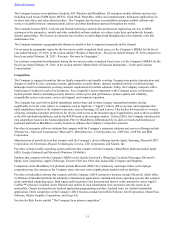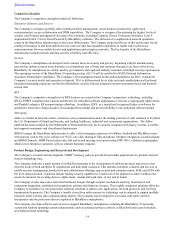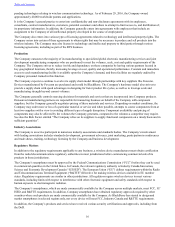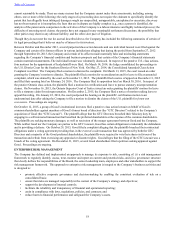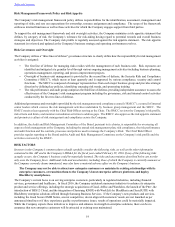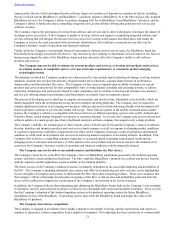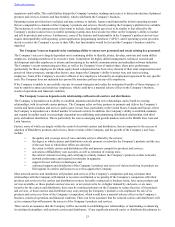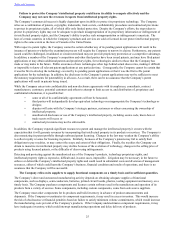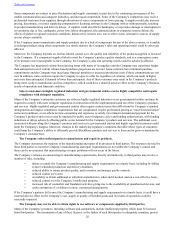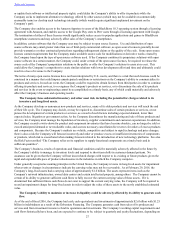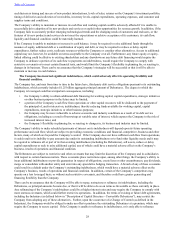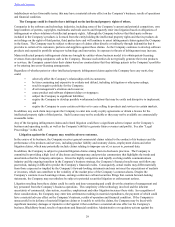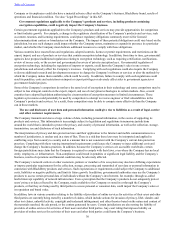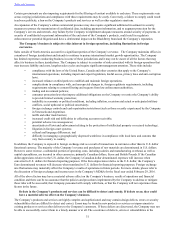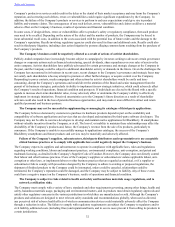Blackberry 2016 Annual Report Download - page 31
Download and view the complete annual report
Please find page 31 of the 2016 Blackberry annual report below. You can navigate through the pages in the report by either clicking on the pages listed below, or by using the keyword search tool below to find specific information within the annual report.
Table of Contents
22
adopted as the industry standard for mobile communication, messaging or machine-to-machine communication. Accordingly,
both the nature of the competition and the scope of the business opportunities afforded by the market in which the Company
competes are uncertain.
The Company’s competitors, including new market entrants, may implement new technologies before the Company does,
deliver new products and services earlier, or provide more attractively priced, enhanced or better quality products and services
than the Company does, making it more difficult for the Company to win or preserve market share. Customers may also
question the Company’s ability to compete or remain viable as a provider of mobile communications solutions over the longer
term and could decide to replace the Company’s products and services with those of its competitors.
Some of the Company’s competitors have greater name recognition, larger customer bases and significantly greater financial,
technical, marketing, public relations, sales, distribution and other resources than the Company does, and such competitors have
increased their market share at the expense of the Company in recent years. In particular, some of the Company’s competitors
have increased their focus on marketing and product development efforts in the enterprise market. In addition, competition may
intensify as the Company’s competitors enter into business combinations or alliances and established companies in other market
segments expand to become competitive with the Company’s business.
The impact of the competition described above could result in fewer customer orders, loss of market share, reduced revenue and
reduced gross and operating margins. Intense competition may also require the Company to reduce its prices, which may result
in the recording of inventory provisions by the Company. If the Company is unable to compete successfully, there could be a
material adverse effect on the Company’s business, results of operations and financial condition.
The occurrence or perception of a breach of the Company’s security measures or an inappropriate disclosure of
confidential or personal information could harm its business.
Attempts by outside parties to access confidential or personal information of companies or their customers have, unfortunately,
become commonplace. Unauthorized parties can attempt to breach a company’s security measures through the actions of
outside parties (e.g., hacking or malware) or employee action (e.g., error, malfeasance, or otherwise), in an attempt to obtain
access to confidential or personal information. Additionally, outside parties may attempt to fraudulently induce employees,
users, partners or customers to disclose sensitive information to gain access to confidential or personal information.
BlackBerry products and services frequently involve the transmission of business-critical, proprietary, confidential and personal
information of end users, and can include on-premise and cloud deployments. The Company may be required to invest
additional resources or change its products, services or network operations to protect itself or its end users against damage
caused by actual or perceived disruptions or security breaches in the future. These actions may have a detrimental impact on
cost, the user experience or compatibility with third party products and services. Since the techniques used to obtain
unauthorized access, disable or degrade service, or sabotage systems change frequently and often are not recognized until
launched against a target, or may not be identified until a later time, the Company may not be able to anticipate these
techniques, to implement adequate preventative measures or to remedy them in a timely manner. The risk that these types of
events could seriously harm the Company’s business may increase as the Company expands the number of web-based products
and services that it offers, increases the number of countries where the Company operates, and expands its ecosystem to offer
third party products and services in conjunction with its own. Third party applications that are downloaded by a user on their
BlackBerry smartphone could also increase the risk of a potential unauthorized access, misuse or misdirection of confidential or
personal information because some applications require access to such information.
If the security measures implemented by the Company or its partners are breached, or perceived to be breached, or if there is an
inappropriate disclosure or misdirection of confidential or personal information, including as a result of a security breach or
virus relating to hardware or software, the Company could be exposed to litigation, potential liability and regulatory sanctions.
Even if the Company was not held liable, a security breach or inappropriate disclosure of confidential or personal information
(or the perception that such a breach has occurred) could materially damage the Company’s reputation, which is built in large
measure on the security and reliability of BlackBerry products and services, and even the perception of security vulnerabilities
in the Company’s products, including its Android-based smartphones, services or network operations, could lead some
customers, particularly governmental customers, to reduce or delay future purchases or to purchase competitive products or
services.
The Company’s products and services are dependent upon interoperability with rapidly changing systems provided
by third parties.
The Company’s platform depends on interoperability with operating systems, such as those provided by Apple, Google and
Microsoft, as well as device manufacturers. Because mobile operating systems are released frequently and the Company
typically has limited advance notice of changes in features and functionality of operating systems and mobile devices, the
Company may be forced to divert resources from its preexisting product roadmap to accommodate these changes. In addition, if
the Company fails to enable IT departments to support operating system upgrades upon release, the Company’s business and



